Tender salute for WWII heroes marks moving Anzac Day in Australia
The fadeout of the great generation that fought in World War II was all too evident this Anzac Day.
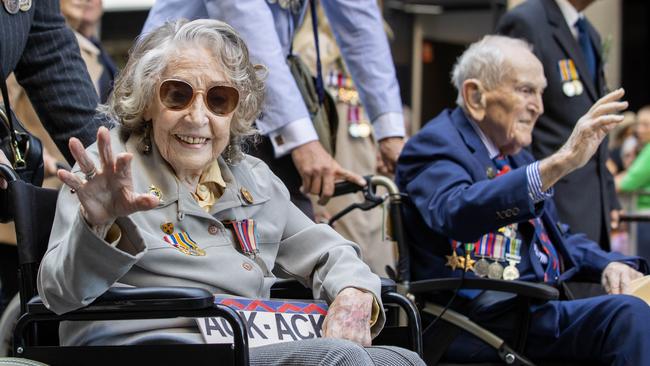
Each year they turn out, and every Anzac Day there are fewer of them.
The fadeout of the great generation that fought the Italians and Nazis in the Middle East or Europe and defended the homeland against looming Japanese invasion was all too evident at Dawn Services and marches on Tuesday, where only a hardy few World War II veterans were on hand.
The growing absence of those who served in the Korean War – aged in their 90s and counting – and the thinning ranks of 70-plus Vietnam vets added poignancy to the long, tender goodbye.
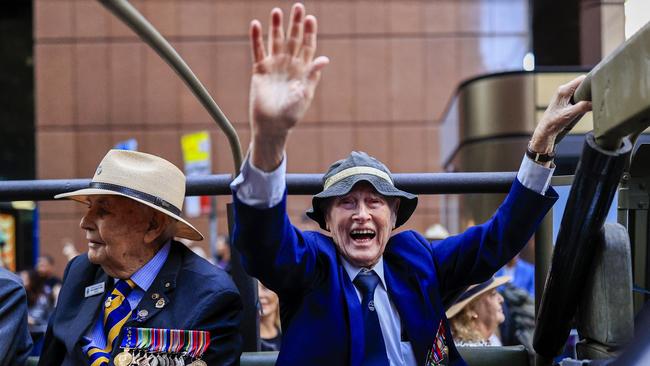
Crowds assembled beneath city towers and in small towns across the nation for the solemnity, colour and movement of the closest thing Australia has to a sacred day, marking the 108th anniversary of the Gallipoli landings in 1915.
At traditional marches, the loudest cheers and warmest applause were reserved for the bemedalled WWII servicemen and servicewomen who finally took off their uniforms in 1945 to pick up lives put on hold during the war.
Anzac Day is tinged with sadness for them, a reminder of the missing faces of cherished mates and old comrades.
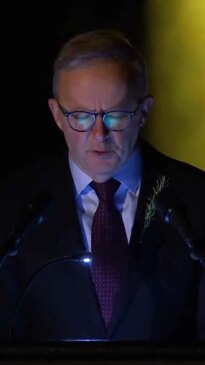
A day when they show the nation what courage and resilience looks like in the flesh.
The people of Adelaide saw it in the frail frame of 102-year-old Keith “Chook” Fowler, who insisted on pushing his walker the full 2km of the march – despite being in the throes of stage-four cancer.
The old boy was still going at the Gilbert St Hotel hours later, surrounded by family, friends and wellwishers, enjoying a beer and the two-up in the front bar.
“It’s fair to say that Chook’s been having a good time,” said his minder, Andrew Thomas, the 66-year-old son of Mr Fowler’s late, great mate, Jack Thomas. Both veterans served in the 2/3rd Machine Gun Battalion before being captured by the Japanese.
“He was waving at the crowd, getting right into it. He got plenty of attention. Everyone was applauding, giving him a cheer.”
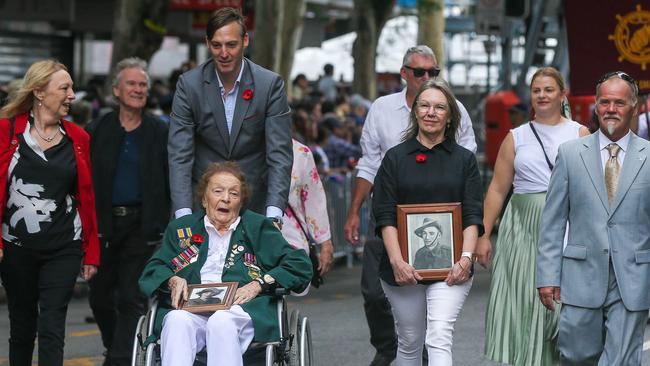
In Brisbane, 99-year-old Cynthia Clifford led the march-past of veterans in a wheelchair pushed by grandson Brandt, clutching a framed photo of herself in WWII uniform as an anti-aircraft gunner. All these years on, she can still hear the roar of the flak guns she trained on in Fremantle, WA.
Fortunately, Japanese bombers never ventured closer than Exmouth on the far-flung Pilbara coast. “They put all the guns next door to me and said, ‘fire’,” she remembered. “It was so loud, the noise, I thought the end of the world was coming so I shot through. The person brought me back and I was OK after that.”

Of the veterans she used to catch up with on Anzac Day, only Len McLeod, 97, is left. He lied about his age to join the air force at 15, and was wounded over New Guinea aboard a supply aircraft making airdrops to the troops.
“It hurts me a lot when I think back to all the unfortunate ones who are unable to make it today,” Mr McLeod said. “Each and every year, the likes of us get very small … it makes me very sad.”
Roy Bryer, 99, was cracking jokes in his jeep with smiling family members. A veteran of the 2/4th Armoured Regiment that took on the Japanese garrison on Bougainville Island, he insisted he was no hero: the knot in his stomach stayed until the end of the war.
He felt lucky to have survived. But his time in the Pacific left an indelible mark when he made it home. “I went through what I went through,” he told The Australian. “I found out I have nerves, I got crabby, I smashed some things.”
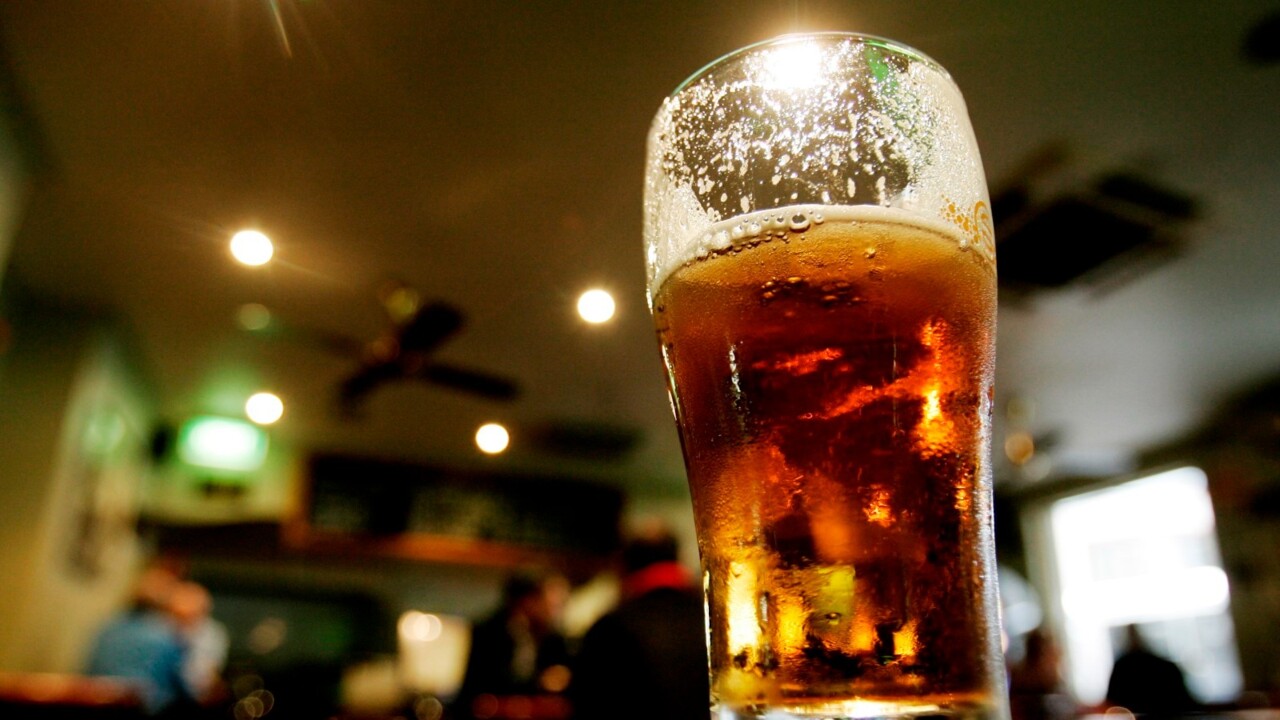
Speaking at the Dawn Service in chilly Canberra, Anthony Albanese said Australians had to do more than remember what veterans had done for the nation down through the years. “If we are to truly honour our veterans, we owe them something more apt than just gratitude. Just as they stepped up for us, we must step up for them,” the Prime Minister said.
“Across our country this morning, Australians have gathered in peace, free citizens of a free nation.
“One hundred and eight years after those first Anzacs set off in their boats, we remember them and all who followed – and we reflect on all that has been made possible by generations of sacrifice.”
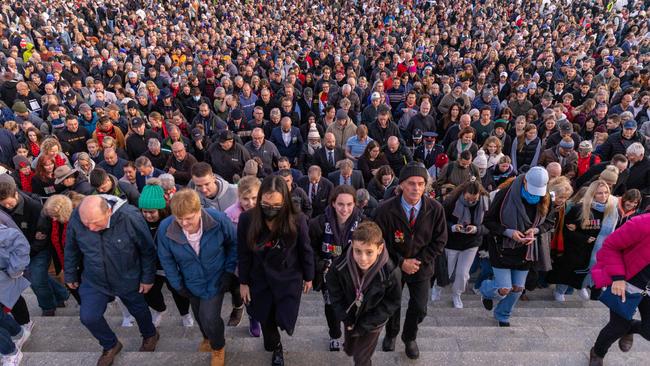
Peter Dutton highlighted the overlooked and blighted legacy of Korea and Vietnam respectively.
“To this day, the Korean War can appear as a mere blip on the historical radar, receiving less attention than it should, given the proximate storm of the Second World War,” the Opposition Leader said.
“To this day, narratives of shame and controversy continue to colour the Vietnam War – such was the enduring influence of the anti-war sentiment and protests of the time. But our veterans deserve much better. Our long dead deserve much better.”
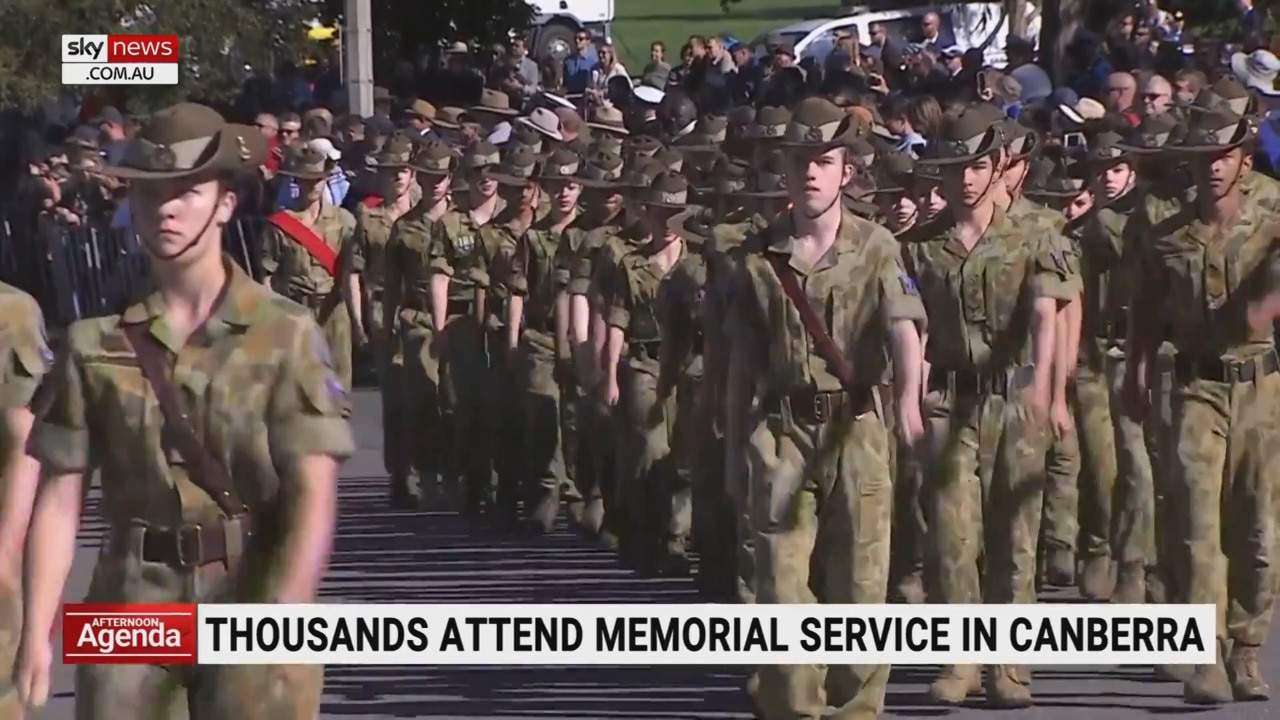
Leslie Jobling, 78, a gunner who served in Vietnam with the 101st Field Battery, was chuffed that the Anzac spirit was “alive and kicking” at the big, enthusiastically received march in Brisbane. “If anything it seems like the parades are getting stronger,” he said.
Maggie Hopcraft, 81, a nurse with the 8th Field Ambulance in Vietnam, will never forget the young soldier she fought to save after he stepped on a landmine. Pointing at her waist, she said: “He went face first into the ground but as he took his weight off the mine, it took him from there … right down to the back of the knees. But he was still alive when we got him and alive when we sent him back.”
Additional reporting: Tricia Rivera, Joanna Panagopoulos

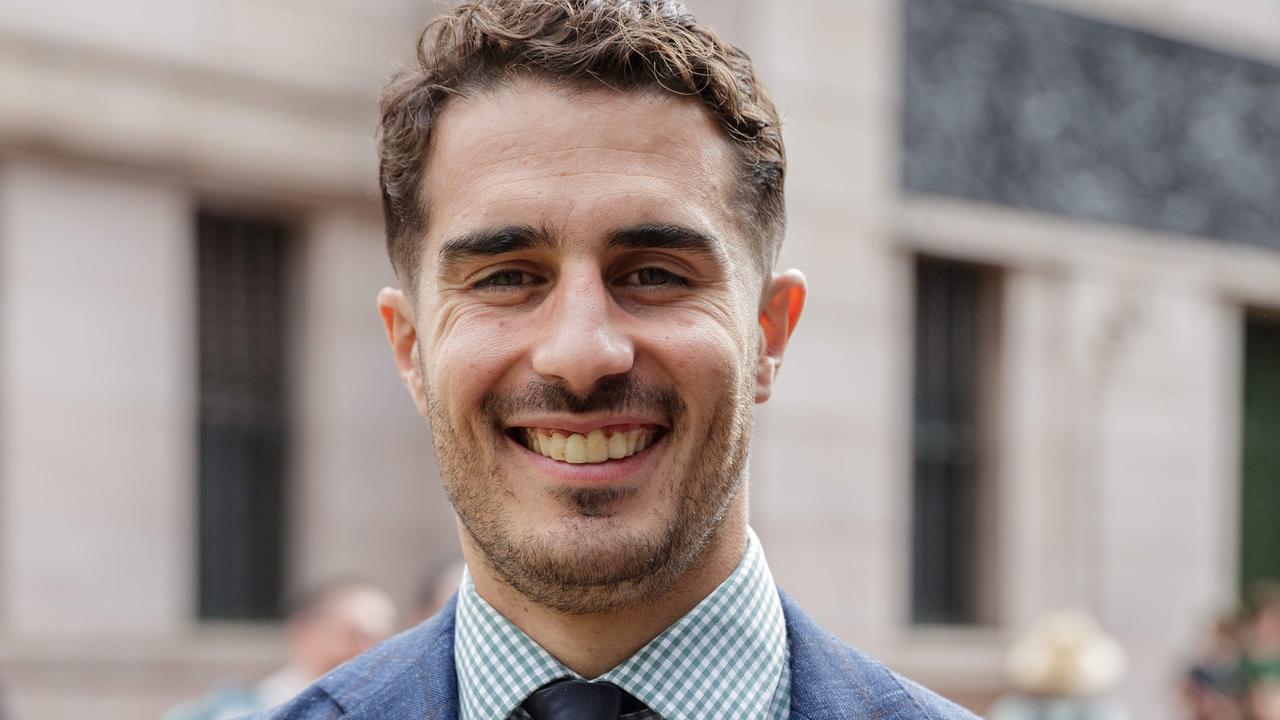
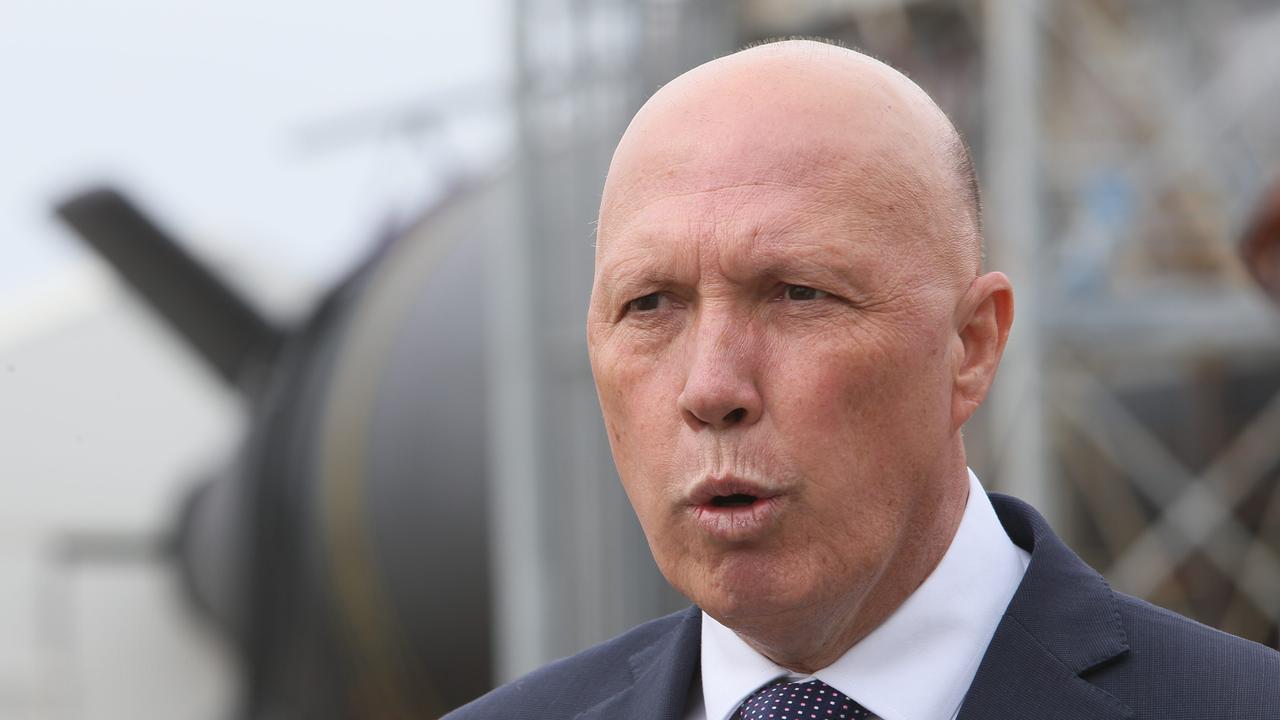
To join the conversation, please log in. Don't have an account? Register
Join the conversation, you are commenting as Logout